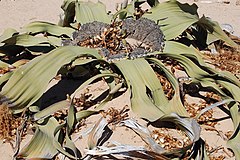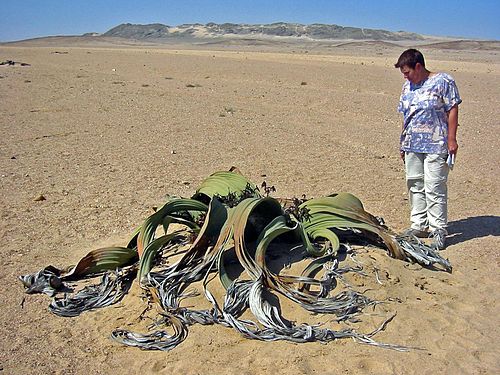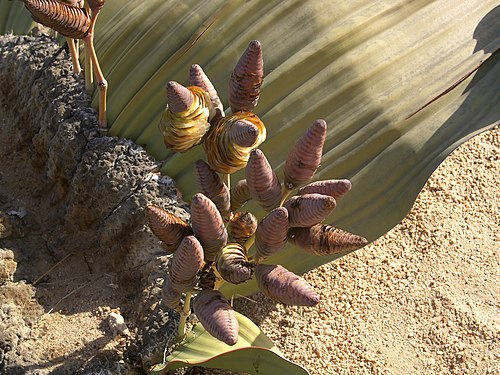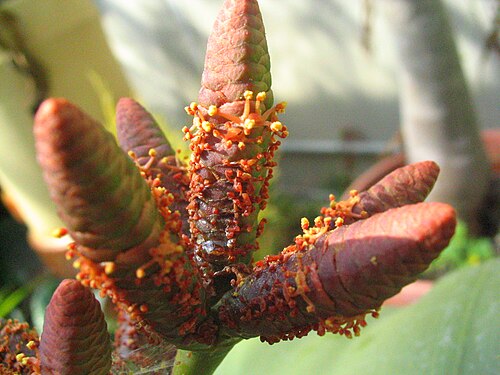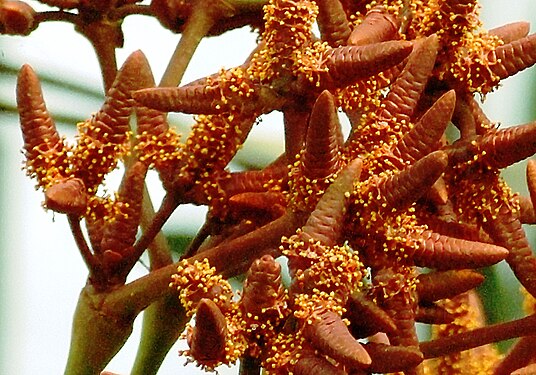Difference between revisions of "Welwitschia mirabilis"
(Created page with '__NOTOC__{{Plantbox | latin_name = ''Welwitschia mirabilis'' | common_names = Tree tumbo | growth_habit = ? <!--- tree, shrub, herbaceous, vine, etc --> | high = 1.4m (? ft) | …') |
|||
| Line 28: | Line 28: | ||
}} | }} | ||
Ancient plant that can live over 1,000 years. Only grows two leaves, which may split as it grows. | Ancient plant that can live over 1,000 years. Only grows two leaves, which may split as it grows. | ||
| + | |||
| + | {{Inc| | ||
| + | syn. Tumboa (native name). Gnetaceae. Applying strictly the rules of priority, T. Bainesii, Hook, f., becomes the name of the strange plant long known as Welwitschia mirabilis; in this work, the description is given under the latter name. | ||
| + | {{SCH}} | ||
| + | }} | ||
==Cultivation== | ==Cultivation== | ||
Revision as of 18:25, 28 September 2009
| Lifespan: | ⌛ | perennial |
|---|---|---|
| Origin: | ✈ | Namibia, Angola |
| Exposure: | ☼ | ?"?" is not in the list (sun, part-sun, shade, unknown) of allowed values for the "Exposure" property. |
|---|---|---|
| Water: | ◍ | ?"?" is not in the list (wet, moist, moderate, dry, less when dormant) of allowed values for the "Water" property. |
Ancient plant that can live over 1,000 years. Only grows two leaves, which may split as it grows.
Read about Welwitschia mirabilis in the Standard Cyclopedia of Horticulture
|
|---|
|
syn. Tumboa (native name). Gnetaceae. Applying strictly the rules of priority, T. Bainesii, Hook, f., becomes the name of the strange plant long known as Welwitschia mirabilis; in this work, the description is given under the latter name. CH
|
Cultivation
- Do you have cultivation info on this plant? Edit this section!
Propagation
The species grows readily from seed, which may be purchased from specialty seed dealerswp. Keep seeds moist for the first few weeks, giving as much heat and light as possible. Seeds from the wild are usually contaminated with spores of Aspergillus niger, causing them to rot soon after germination.
Pests and diseases
- Do you have pest and disease info on this plant? Edit this section!
Species
Gallery
If you have a photo of this plant, please upload it! Plus, there may be other photos available for you to add.
References
External links
- w:Welwitschia mirabilis. Some of the material on this page may be from Wikipedia, under the Creative Commons license.
- Welwitschia mirabilis QR Code (Size 50, 100, 200, 500)
